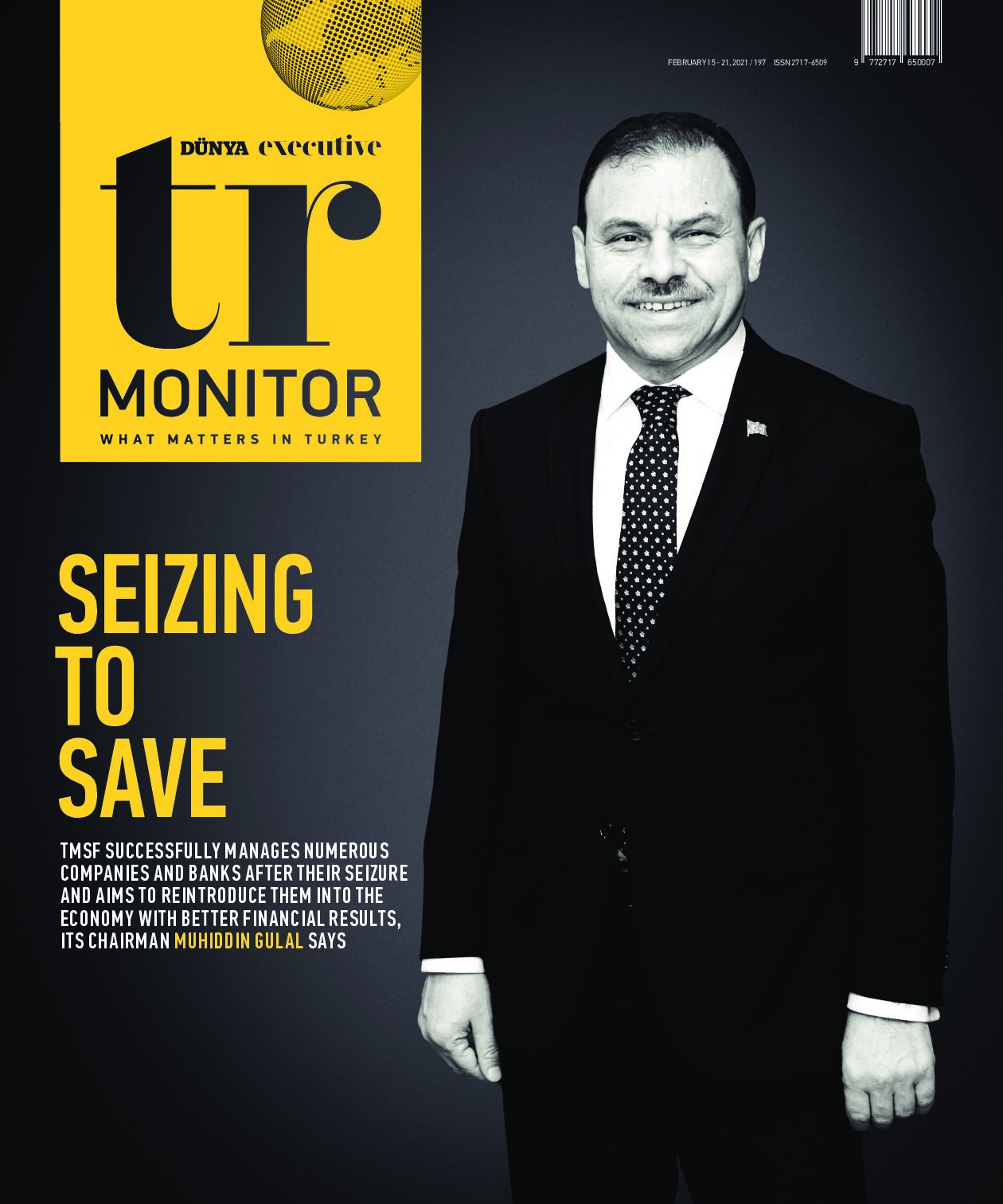ESTABLISHED AS A SMALL unit to insure deposits in 1983, the Savings Deposit Insurance Fund (TMSF) has turned into an institution that ‘seizes’ financially-troubled companies and banks. Today the assets of 796 companies managed by TMSF amount to TRY 70.5bn. Speaking to daily DUNYA editors Hakan Guldag, Vahap Munyar and Seref Oguz, TMSF Chairman Muhiddin Gulal offered some clarity on the activities of the institution and its future plans.
We first started to hear about the Savings Deposit Insurance Fund (TMSF) due to the liquidation process of banks and depositors’ riots during the 2001 economic crisis. TMSF took over the bankrupt banks and merged some with other banks in the market after crises arising in the banking sector in that period. As an institution bearing the loss of account owners on behalf of the public, it became an important organization in the transfer of banks to the market after their management activities. Thus, TMSF has turned into a public administration with extraordinary authorities for the collection of receivables of bankrupt banks.
However, especially recently, we have started to see it in the news as an institution ‘seizing’ companies and banks that find themselves in financial trouble for a variety of reasons. But, beyond the seizures, TMSF actually has crucial functions in terms of protecting the public’s interests and contributing to the national economy and financial stability of the country. For instance, the risk-based insurance premium system implemented in Turkey was shown to be one of the best practices in the world in 2012, according to the Financial Stability Board’s (FSB) Thematic Review on Deposit Insurance System. It’s a persistent fact that TMSF’s ‘proactive’ management approach had a role in this.
In practical terms, TMSF was established as a small unit to insure deposits under the Central Bank’s representation and administration in order to protect account owners’ rights and interests in 1983. But its corporate status, functions and responsibilities evolved with consecutive financial crises. “TMSF successfully managed numerous companies in terms of collecting public receivables, brought them into the national economy by putting them on the market for sale, and developed important skills, as well as qualified personnel after the 2001 banking crisis,” says TMSF Chairman Muhiddin Gulal (see the success story of Erciyes Anadolu Holding under TMSF management).
When Banking Law No. 5411 entered into force in 2005, TMSF became a legal regulatory public entity with broad authority regarding collection of receivables, shaping bank resolutions and determining policies on deposit insurance in accordance with international norms.
Afterward, TMSF shouldered more responsibilities depending on the developments in the country’s politics. Following the 2016 Turkish coup attempt, tasks and powers of trusteeship, which were possessed by companies assigned to a trustee due to their attachment, relation or contact with terrorist organizations (namely FETO, the Gulenist terrorist organization), were handed over to TMSF with the Decree Law No. 674. To put it simply, TMSF performs its duties along with the powers dedicated to it, according to the Banking Law No. 5411 and the Law No. 6758 on amending and accepting some regulations made by the Decree Law within the scope of the State of Emergency and other relevant legislation today. TMSF’s four main functions are deposit insurance, bank resolution, recovery and trusteeship operations, according to the relevant legislation.
TMSF can take over the management and supervision of a company, when it collects public receivables within the frame of powers specified by the Banking Law or when it will be appointed as trustee to the companies or assets, whose relation or contact with terrorist organizations are confirmed by court decision. “Trustees are chosen from people who are experts in their subjects, have experience in the public or private sector, are experienced and competent in financial and legal issues and are trusted,” Gulal notes.
TOTAL ASSETS AMOUNT TO TRY 70.5BN
On the company front, TMSF takes the Commercial and Economic Integrity (TIB) decision by exercising its authorities in the Banking Law and the relevant legislation. Then it takes a variety of measures, including loan supports, so that these companies become operational.
Within this frame TMSF has been appointed as trustee to 796 companies in 38 provinces in total within the scope of the decree laws to date, according to Gulal. “As of December 31, 2020, their size of assets grew by 66% to TRY 70.48bn, total equities grew by 63% to TRY 29.44bn, turnover increased by 69% to TRY 36.12bn and their profits rose by 221% to TRY 3.86bn, compared to their transfer dates. Moreover, 40,061 people are employed by these companies.”
USD 17.8BN WAS COLLECTED
In addition to the companies, 26 banks were transferred to TMSF, 24 of which were transferred before 2003. Debt and collection follow-up processes in relevant controlling shareholder groups of these banks have been conducted. Meanwhile, follow-up and collection processes relevant to corporate and personal loans are also carried out.
“Frankly,” Gulal says, “TMSF works to resolve these banks efficiently and rapidly with the least cost burden on the public. It provides ways for bankrupt banks to leave the system without shaking confidence and reintroduces the ones likely to survive into the system. TMSF transferred funds worth USD 31.6bn at historical values, mostly in 2000 and 2001 in their resolution processes.”
Within the scope of the resolution of the banks transferred to TMSF, nearly 208,000 receivable files were assigned and transferred to TMSF as of December 31, 2020. From non-performing loans, USD 17.8bn in total was collected from their transfer date to December 31, 2020, Gulal notes. Nearly USD 250m is projected to be collected in the next period. As of December 31, 2020, total collection provided from bank resolutions and debt follow-up incomes, including financial incomes, reached USD 23.2bn. “This collection amount indicates a high recovery rate on an international scale,” says Gulal. Total deposits insured by TMSF reach TRY 866bn.
On the deposit insurance front, the reason why TMSF was established in the first place, the deposits insured by TMSF and included in the scope of insurance totalled nearly TRY 866bn while total deposits in Turkey amounted to TRY 3.5tr as of December 2020. The deposit insurance reserve kept by TMSF is TRY 64.1bn as of January 2021, which equals 7.4% of total deposits and participation funds within the scope of the insurance. “This rate shows a strong level above international standards,” Gulal notes, “because it is below 1% in big European countries and stands at 1.4% in the U.S. On the other hand, TMSF also continues to work toward bringing commercial deposits into the scope of the insurance.
TWO BANKS TO BE REINTRODUCED TO THE SYSTEM
Traditionally, TMSF has become one of the most important insurers in Turkey with its services provided in savings deposit insurance, which is also the main mission of the institution. That’s why it plans to continue improving its activities in deposits insurance, considering international developments and Turkey’s financial conditions as well as it aims to maintain the assurance provided to savings deposit in the strongest way, according to TMSF Chairman. “We are planning to reintroduce Turk Ticaret Bankasi and Adabank in the sector. In this context, Turk Ticaret Bankasi will regain official authorization and Adabank will be put on sale.”
In conclusion, it’s also worthy to note that TMSF considers the companies under its management as deposits of the nation. “That’s why we strive to manage them as a cautious trader,” Gulal says. Within this scope, sales and initial public offerings of the companies to which TMSF became trustee after the finalization of the judicial process, or their transfer to the Turkey Wealth Fund will be carried out by TMSF in the next period. Thus, TMSF will be able to reintroduce them to the national economy.
FOUR MAIN RESPONSIBILITIES OF TMSF
>> Deposit insurance: Insuring deposits and participation funds in order to protect the rights and interests of account owners
>> Bank resolution: Managing the banks, strengthening their financial structures, restructuring, transferring, merging, selling and liquidating
>> Recovery: Performing and concluding the follow-up and collection procedures for TMSF receivables
>> Trusteeship: Managing the TMSF’s assets and resources and performing tasks within the scope of the state of emergency
TMSF’S PLANNED OPERATIONS FOR THE FUTURE
>> Turk Ticaret Bankasi: Founded in 1913 as the first bank established by the private sector, it transferred to TMSF in 1997. TMSF aims to reintroduce it to the national economy.
>> Adabank: Established in 1984, TMSF took over Adabank in 2004. TMSF plans to sell it.
>> Erciyes Anadolu Holding: The conglomerate was transferred to TMSF in 2016 within the scope of the FETO/PSS investigation. The trial court condemned the company, whose case is at the court of cassation at this moment. The company will be sold by TMSF with the finalization of the court decision.
>> Fi Yapi: Operated in the construction and real estate sectors, the company was transferred to TMSF in 2016 within the scope of the FETO/PSS investigation. It had declared bankruptcy in 2008 and couldn’t deliver its housing projects. The company has an island in Dikili district of Izmir. TMSF plans to sell the island.
>> Koza Gold Corporation: Established in 1989 as the first mining company of the country extracting and processing gold throughout the history of the republic. The company is subject to an ongoing FETO/ PSS investigation. After the investigation is complete, the transfer of the company to TMSF will become an option.
>> Planned sales in 2021: Aynes Food, Alfemo, Aker Textile, MarkAntalya shopping mall and Central Hospital.
BEST PRACTICES DURING TMSF’S TRUSTEESHIP PERIOD
>> Koza Group: The conglomerate was transferred to TMSF in 2016 as a result of the Fethullah Terrorist Organization (FETO)/ Parallel State Structure (PSS) investigation. Its equities amounted to TRY 5.1bn in 2016, which increased by 116% to TRY 11.02bn as of December 31, 2020 and its asset size rose by 135% to TRY 12.56bn, from TRY 5.34bn in this period.
>> Naksan Plastik: The conglomerate was transferred to TMSF in 2016 within the scope of the FETO/PSS investigation. The company, which went bankrupt, has been operationalized and has made operating profit after its transfer to TMSF. Production capacities at Naksan Plastik’s and Nakpilsa’s plants currently stand at 64% and 76%, respectively.
>> Surat Kargo: The company came under the umbrella of TMSF as of 2015, when it posted losses of TRY 14m. It ended 2020 with profits of TRY 57m. The company’s equities increased by 139% to TRY 56m, its asset size rose by 120% to TRY 201m and turnover increased to TRY 765m, from TRY 275m in this period. As of today, 6,204 people are employed at Surat Kargo.










